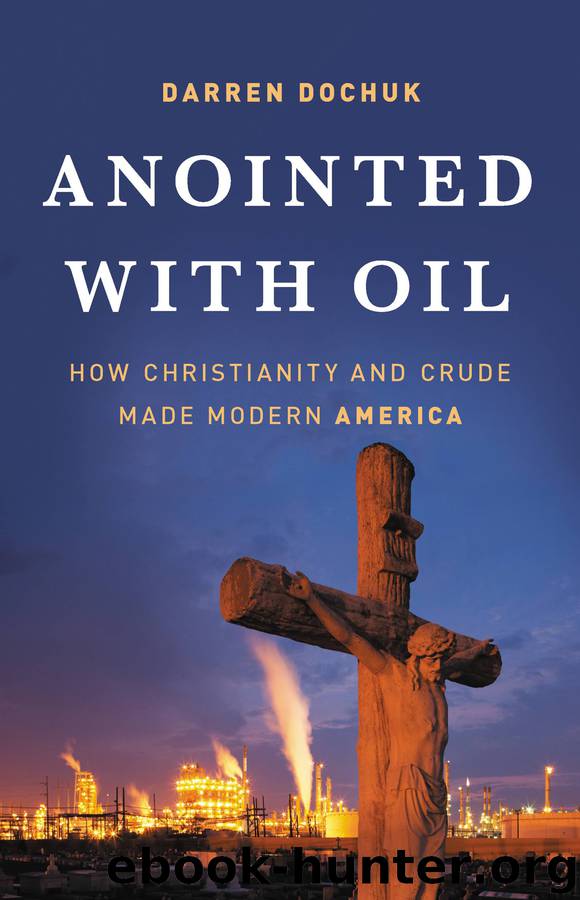Anointed with Oil by Darren Dochuk

Author:Darren Dochuk
Language: eng
Format: epub
Publisher: Basic Books
Published: 2019-06-03T16:00:00+00:00
GRAHAM AND HIS movie’s message cut to the heart of the Southwest’s sense of regional and religious independence, as well as the new evangelicalism’s emerging priorities. But they also added color and conviction to wildcat politicking, which, even as Oiltown, U.S.A.’s production unfolded, was reaching a feverish pitch. This politicking played out because of developments in the oil frontier that Robert Kerr was instrumental in uncovering in 1947: the Gulf of Mexico. Thanks to the cultural front forged by independent oilmen and their allies in evangelical pulpits, it resulted in one of the first major, successful displays of the oil patch’s determination to fight the federal government, portending what was to come in partisan politics.
Even as southwestern independents celebrated the monumental Kerr-McGee strike that shifted exploration to the Gulf of Mexico, they grew wary of a foe that had its own aspirations for offshore oil. That foe had begun signaling its intentions years before. In 1945 President Harry Truman issued an executive proclamation that placed the federal government in charge of oil deposits off the Gulf Coast. At the time—even though Robert Kerr had not yet shown how to access it in deeper waters—experts believed that this seabed held millions of barrels of crude, thus a potential windfall. By then, numerous oil companies, ranging from the imposing Shell and Texaco to the smaller Sun and Kerr-McGee, were acquiring state leases that let them explore thousands of acres of the gulf’s “continental shelf.” The prospect of losing the funds generated by this practice incensed Texans especially. For a century they had believed that their state held sole ownership of waters stretching three leagues (10.35 miles) into the gulf. This arrangement had been passed on to them from the Republic of Texas, which had gained its authority upon independence from Mexico. For Texans, Truman’s initiative was an insult to their heritage. But it meant more than this. In 1939 the Texas Legislature had earmarked all revenues from exploration in the tidelands for public education. By the mid-1940s parents saw offshore leasing as a way to guarantee their children’s access to higher learning. Other Truman critics—including a dethroned Harold Ickes—would soon rally around that same notion. “The off-shore oil belongs to all the people,” the former secretary of the interior would bark in his new career as a journalist; “save the tidelands for the schools.” In challenging the status quo Truman thus did more than trigger a storm in the Lone Star State’s legislature; he set one off in its local communities as well.53
Developments during the late 1940s accentuated the tension. In 1947, the Supreme Court rendered a decision in favor of federal jurisdiction over California’s tidelands, another key battle zone. Justice Hugo Black explained the ruling succinctly: “California is not the owner of the three mile marginal belt along its coast, and the federal government… has paramount rights in and power over the belt [and] dominion over the resources of the soil under that water including oil.” Although the ruling applied only
Download
This site does not store any files on its server. We only index and link to content provided by other sites. Please contact the content providers to delete copyright contents if any and email us, we'll remove relevant links or contents immediately.
The 5 Love Languages: The Secret to Love That Lasts by Gary Chapman(8497)
The Space Between by Michelle L. Teichman(6088)
Assassin’s Fate by Robin Hobb(5237)
Wiseguy by Nicholas Pileggi(4586)
Everything Happens for a Reason by Kate Bowler(4067)
Gerald's Game by Stephen King(3918)
A Simplified Life by Emily Ley(3572)
The Power of Positive Thinking by Norman Vincent Peale(3449)
Pillow Thoughts by Courtney Peppernell(3397)
Resisting Happiness by Matthew Kelly(2887)
Girl, Wash Your Face by Rachel Hollis(2821)
Being Aware of Being Aware by Rupert Spira(2706)
Name Book, The: Over 10,000 Names--Their Meanings, Origins, and Spiritual Significance by Astoria Dorothy(2490)
Real Sex by Lauren F. Winner(2474)
More Language of Letting Go: 366 New Daily Meditations by Melody Beattie(2444)
The Holy Spirit by Billy Graham(2418)
Fast Facts on Defending Your Faith by John Ankerberg & John Weldon(2388)
Victory over the Darkness by Neil T. Anderson(2386)
The Secret Power of Speaking God's Word by Joyce Meyer(2253)
